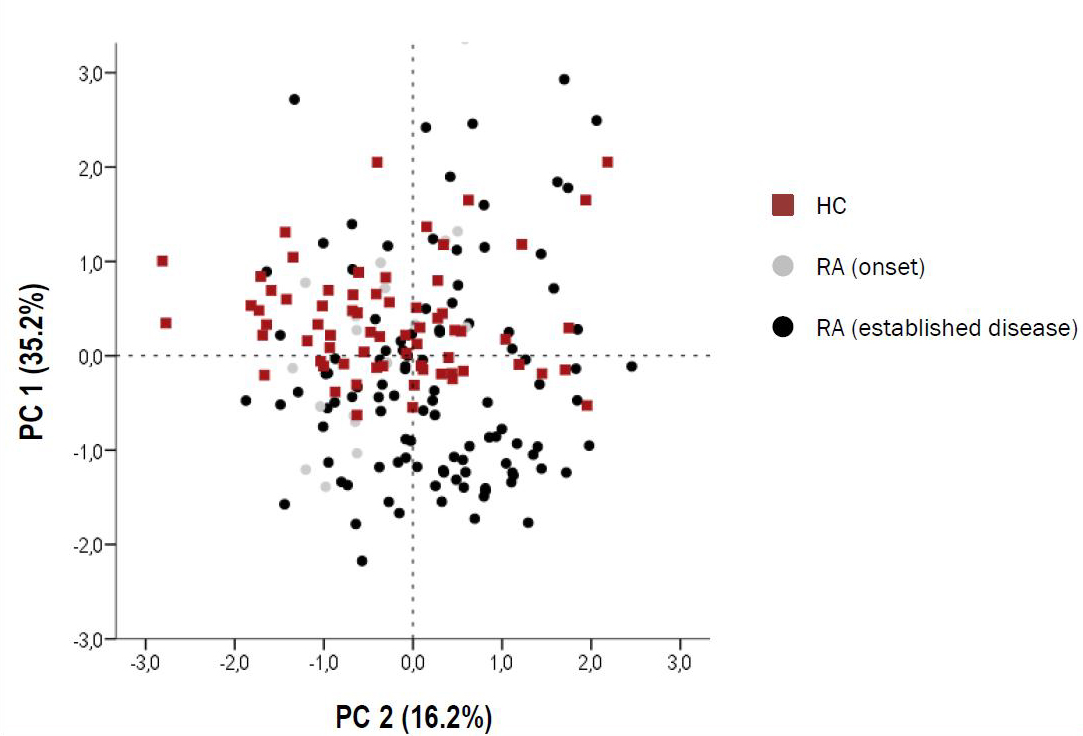Session Information
Date: Monday, November 9, 2015
Title: Cytokines, Mediators, Cell-cell Adhesion, Cell Trafficking and Angiogenesis Poster II
Session Type: ACR Poster Session B
Session Time: 9:00AM-11:00AM
Background/Purpose: Lipidomics is an emerging field in biomedical research. Free Fatty Acids (FFA) are important mediators of the lipid metabolism which can play a role in a number of biological functions other than energetic ones. FFA have been described to affect gene expression patterns in monocytes and macrophages, as well as modulation of CD4+ T-cell function. Since a role for FFA in the pathogenesis of rheumatic diseases can he hypothesized, we aimed to evaluate the serum FFA profile in Rheumatoid Arthritis (RA) patients.
Methods: serum FFA (palmitic, stearic, oleic, palmitoleic, linoleic –LA–, a-linolenic –ALA–, g-linolenic –GLA–, eicosapentanoic –EPA–, docosahexanoic –DHA– and arachidonic –AA–), were quantified by LC-MS/MS chromatography after a methyl-tert-butylether extraction protocol in samples from 69 healthy controls and 129 RA patients. Moreover, 13 prospectively-followed RA patients undergoing TNFa-blockade were included. IFNg, TNFa and MCP1 serum levels were quantified by immunoassays.
Results: Lower levels of palmitic (p<0.0001), oleic (p=0.005), palmitoleic (p=0.003), ALA (p=0.023), EPA (p<0.0001), DHA (p<0.0001) and AA (p=0.031) were found in RA patients. Although w3-polyunsaturated FFA were mainly decreased, there was not a general pattern of FFA associated with the chain length or the degree of desaturation, but individual FFA within a given class seems to exhibit a particular pattern. Principal Component Analysis supported this observation (Figure 1). These differences were more pronounced in patients with two copies of the shared epitope (SE) compared to patients with a single copy or SE-negative. No associations with disease activity or autoantibodies status were found.
Decreased FFA were associated with disease duration, whereas stearic acid exhibited a positive correlation (r=0.431, p<0.001). Additionally, stearic acid was positively correlated with IFNg levels (r=0.408, p<0.0001), whereas EPA and DHA negatively did (r=-0.226, p=0.016 and r=-0.237, p=0.011, respectively). Equivalent results were observed with MCP-1 levels, but no associations were found with TNFa. No differences by glucocorticoid or methotrexate usage were found.
Finally, decreasing DHA, EPA and AA levels (all p<0.050) were found in patients who exhibited no response upon TNFa-blockade, whereas no changes were found among good-responders (n=5; p>0.05 in all cases).
Conclusion: RA patients exhibited a different serum FFA profile associated to disease duration and inflammatory cytokines. Specific FFA were found to be decreased, independently of their chemical characteristics. Decreased levels of some FFA were associated with poor clinical outcome upon TNFa-blockade. These findings could support the use of fatty acid supplementation in RA and prove this field worthy or further research.
Figure 1: Principal Component Analysis of serum FFA in RA patients and HC.
To cite this abstract in AMA style:
Rodríguez-Carrio J, Alperi-López M, López P, Ballina-García J, Suárez A. Specific Profile of Serum Free Fatty Acids Is Found in Rheumatoid Arthritis Patients [abstract]. Arthritis Rheumatol. 2015; 67 (suppl 10). https://acrabstracts.org/abstract/specific-profile-of-serum-free-fatty-acids-is-found-in-rheumatoid-arthritis-patients/. Accessed .« Back to 2015 ACR/ARHP Annual Meeting
ACR Meeting Abstracts - https://acrabstracts.org/abstract/specific-profile-of-serum-free-fatty-acids-is-found-in-rheumatoid-arthritis-patients/

